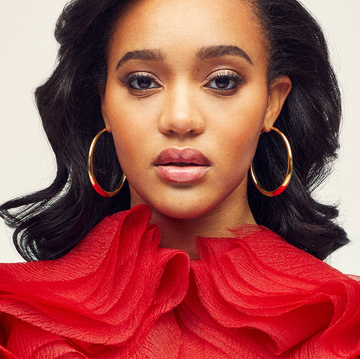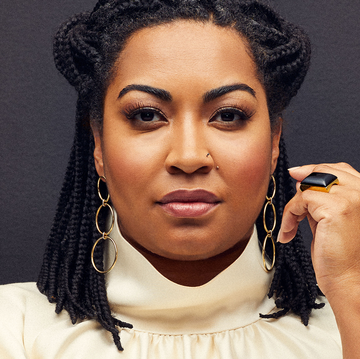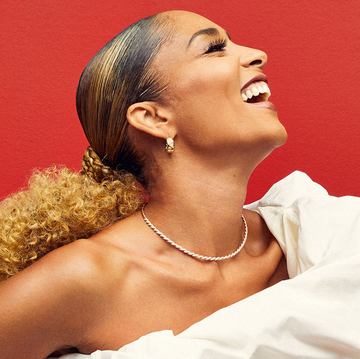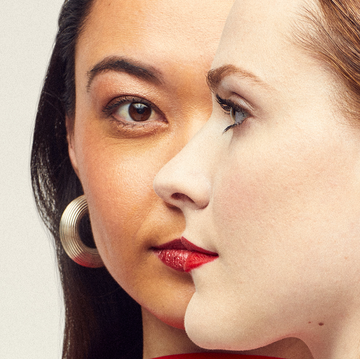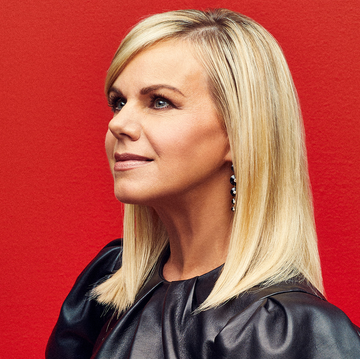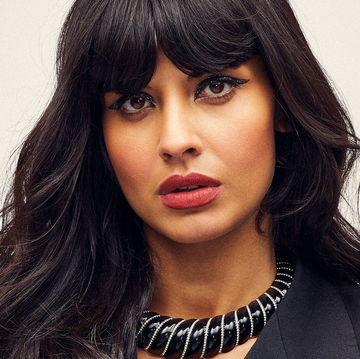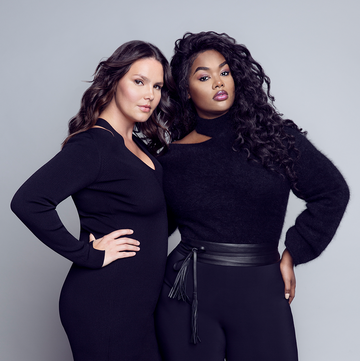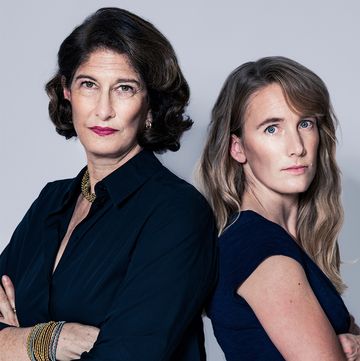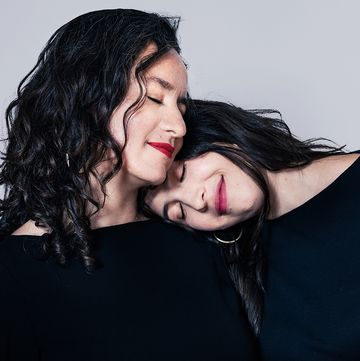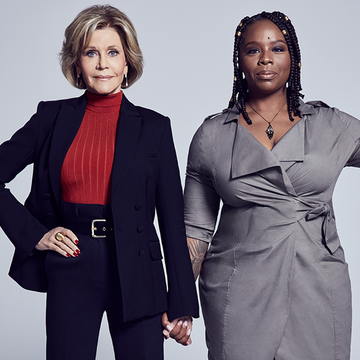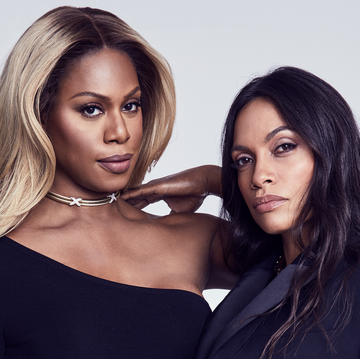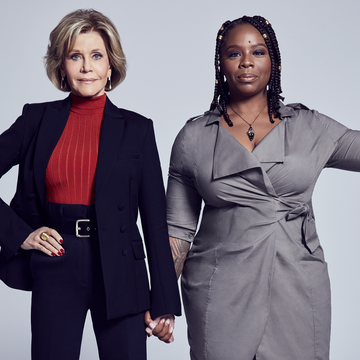The new generation of #WomenWhoDare are those who refuse to conform. They dare to do the impossible, encouraging young visionaries to break—not just push—boundaries, inspiring people around the world to fight for what they believe in. Here, Keah Brown talks to best-selling author Roxane Gay about some uncomfortable truths for our 2017 Women Who Dare series.
“On Twitter, I just don’t give a fuck,” Roxane Gay tells me on the phone with a laugh.
The best-selling author, who quickly became a hero for millennial women—myself included—with Bad Feminist in 2014 and Difficult Women last winter, is known for her social media clapbacks. Often, people come for her simply because she is fat, black, and a (vocal) woman with a platform, but her comebacks are the tweets of legend: Like the time a troll declared her 140-character response to a topic insufficient, and she answered that her reply would be through The New York Times—and it was. Or the time she simply responded, "GOOGLE ME".
Gay, who grew up in Nebraska, admits that it is in her writing—on social media or otherwise—that she feels the most seen and heard. "I’m pretty shy and quiet, but writing is a place where I don’t have to be shy or quiet. And that’s exhilarating," she says, adding, "I can be very daring on Twitter." This, though, has led to some impossible expectations from readers and fans, who often demand her to be, what she calls, an opinion vending machine. "When something terrible happens, people expect me to have an immediate response," says Gay. "It's singing for your supper." Fortunately, with three best-selling books under her belt, she is at a place in her career where she can be reflective, taking more time to formulate her opinions—a privilege she would like to see extended to other thinkers today. "Now I’m allowed to be more thoughtful in how I respond to things. But when you're first starting out, you're always expected to have an immediate response, often for 'exposure,'" she reveals.
Still, when it comes to the subject of bodies, Gay is always armed with a lightning rod response. Particularly fat bodies, and the way the world treats them. Gay deals with a lot of pushback from the world about her body, and despite her growing level of recognition, she is constantly expected to answer for it. "I really wish people would see fat people as humans. Our bodies are vulnerable, our bodies are strong; they matter just like other bodies," says Gay, whose third book, Hunger, is a powerful memoir about food, weight, and self-image. "They are not all necessarily diseased," she continues. "A lot of times people see fatness as sickness and that’s not necessarily the case, just like thinness is not necessarily equated with health. I wish people had more empathy and consideration for different types of bodies and didn’t immediately start to approach fat bodies as, ‘Oh, this is a problem and this problem needs to be solved.’ That’s just such a bad way to go about treating other human beings."
Certainly, Roxane Gay is more than just her body. She is a human being and a queer black woman. Her queer black womanhood is important to note, because although she tries not to think of her audience when she writes (“You start to pander, to be disingenuous. On the page I’m just trying to be myself,” she clarifies), Gay acknowledges that she mainly writes for black women and the LGBTQ+ community. The distinction is necessary, even though, as a fierce believer in intersectionality, she feels it unfair to parcel out identity in this way. "In general I write for marginalized people. I start with black women because I think black women are the least respected and least heard voices in the world. So I always put that first before anything else, because when I’m walking down the street people see my blackness first—and my size." She also thinks about people of color, in general, as well as those with different abilities, queer people, and "all of those who don’t get enough of a voice," she says. "I’m thinking about all of us before I ever, in my life, think about a white man and what the hell he thinks.”
(Me too.)
In fact, the voice that matters most to Gay is the voice of her mother. Her mother, she says, is the most daring woman in her life. She admires her opinionated nature, and believes that had her mother not chosen to stay home to raise her and her brothers, she could have achieved anything with her brilliance and humor. But despite her own accomplishments, Gay doesn’t always view herself in the same light. "I don’t think of myself that way, but when I look at my body of work and the kind of things that I do on the page, I definitely think I can be daring in my writing, mainly because I have always told myself, ‘Oh, Roxane, don’t worry no one is going to read it anyway. You can really just say any old thing,’ and that has really given me the confidence. But the more successful I get, the harder it is to maintain that delusion," she laughs.
Often, as with the significance of Gay’s own writing for an entire generation of women who devour her uncomfortable truths, we are most impacted by the people we share a connection with, even from afar. For Gay, her most significant connections weren’t always with people she knew personally. "It was Little House on the Prairie because I’m from Nebraska," says Gay of the first book that truly influenced her. "Growing up in Nebraska, it’s kind of boring, it’s the middle of nowhere, and no one would believe that I was actually born and raised in Nebraska because I’m black. People seem to think that we don’t exist in certain places and I just loved that you could be from the plains and have an extraordinary ordinary life, which is how I saw Laura Ingalls Wilder in the books."
Today, Gay loves many of the same women we do. She quickly lists off her favorite authors right now: Ashley C. Ford, Morgan Jerkins, Zadie Smith, and Tressie McMillan Cottom (her favorite public intellectual); then there's Oprah Winfrey, who she admires the most. She loves Beyoncé for many of the same reasons. But Gay’s own impact on black women should not be understated. Her work has meant so much to so many people, including myself.
I first met Gay at the University of Buffalo with shaky hands and a smile so wide that my cheeks hurt. She said Hello, Keah first. At that moment, the air left my body briefly—not out of ego, but because when Roxane sees you, it is recognition from someone who helps you see yourself.
Fitting then, that her next project, slated for a 2018 release, will be her first Young Adult novel titled, The Year I Learned Everything. But she isn't stopping there. Gay is also working on a TV show and two nonfiction books coming out in 2019 and 2021, respectively. One is an “anti-writing manual” and the other, an essay collection focusing on our country's television content “and what that says about modern day America.”
Gay says she creates both fiction and nonfiction to reach the truth in different ways— something of increasing importance in an era of fake news. “Instead of just saying, ‘Because I said so,’ I realize the importance of being able to support your arguments in credible ways,” says Gay. “Of course I find the personal to be a valid way to narrate the world we live in, but you need more than just the personal. It can’t just be all about you. To really succeed, you have to look outward as much as you look inward."



